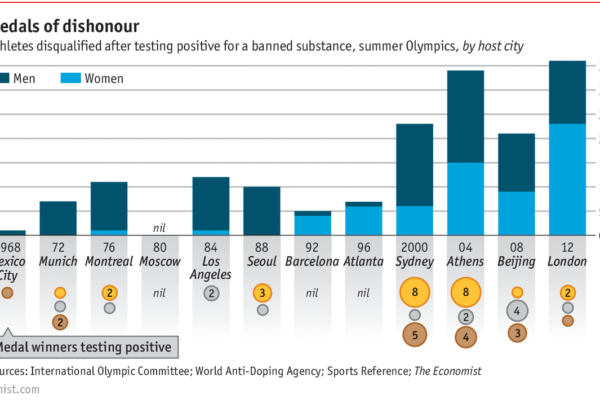
The Tarnished Glory: How Doping Has Undermined the Integrity of the Olympics
The Olympics have long stood as a beacon of human achievement, fair play, and international unity. Yet, over the years, the integrity of this prestigious event has been repeatedly tarnished by doping scandals. Athletes from various countries have resorted to performance-enhancing drugs (PEDs) to gain an unfair edge, compromising the spirit of fair competition and the honor associated with Olympic glory. Among the most notable offenders are China, the United States, and Russia, whose doping incidents have marred the history of the Games. The Chinese Doping Scandals China’s rise in the world of sports has been accompanied by a series of doping scandals that have cast a shadow over its achievements. The most significant of these incidents involved Chinese swimmers and weightlifters, who were found to have used banned substances to enhance their performance. Sun Yang, one of China’s most celebrated swimmers, faced multiple doping allegations. In 2014, he was suspended for three months after testing positive for the banned stimulant trimetazidine. Although he retained his Olympic medals, the incident raised serious questions about the legitimacy of his achievements. In 2020, Sun received an eight-year ban for refusing to cooperate with a doping test in 2018, further damaging his reputation and that of Chinese swimming. In weightlifting, Chinese athletes have also faced significant scrutiny. During the 2008 Beijing Olympics, three Chinese weightlifters, including gold medalists Liu Chunhong and Cao Lei, were stripped of their medals after reanalysis of their samples revealed the presence of banned substances. These cases highlighted the extent to which doping had infiltrated Chinese sports and led to increased calls for stricter anti-doping measures. The United States and High-Profile Doping Cases The United States, despite its leading position in global sports, has not been immune to doping controversies. High-profile cases involving athletes such as Marion Jones and Lance Armstrong have severely impacted the credibility of American sportsmanship. Marion Jones, once hailed as the fastest woman on earth, won five medals at the 2000 Sydney Olympics (three gold and two bronze). However, her career came crashing down when she admitted to using steroids supplied by the notorious BALCO laboratory. Jones was subsequently stripped of her medals, and her fall from grace served as a stark reminder of the pervasive nature of doping in athletics. Cycling legend Lance Armstrong also found himself at the center of a massive doping scandal. Armstrong, who won a bronze medal in the time trial at the 2000 Sydney Olympics, was later revealed to have used a sophisticated doping regimen involving EPO, human growth hormone, and blood transfusions. His systematic cheating led to him being stripped of his Olympic medal and seven Tour de France titles, profoundly shaking the world of professional cycling. The Russian Doping Cases Perhaps the most egregious example of doping in recent history involves Russia, whose state-sponsored doping program was exposed in a scandal that rocked the sports world. The scale and organization of the program, which aimed to dominate the Olympics through systematic cheating, were unprecedented. The 2012 London Olympics and the 2014 Sochi Winter Olympics were heavily affected by Russia’s doping scheme. An investigation by the World Anti-Doping Agency (WADA) revealed that Russian officials had manipulated test results and tampered with samples to ensure their athletes passed doping controls. As a result, numerous Russian athletes were stripped of their medals, and the country faced partial bans from subsequent Olympics. Notable athletes affected by the scandal include Anna Chicherova, who lost her bronze medal in high jump from the 2012 London Olympics, and Tatiana Lysenko, who was stripped of her gold medal in hammer throw from the same Games. The exposure of Russia’s state-sponsored doping program led to significant sanctions and highlighted the lengths to which some nations would go to achieve Olympic success. The Impact on Olympic Integrity The pervasive issue of doping has had a profound impact on the integrity of the Olympics. Each doping scandal not only undermines the achievements of those caught cheating but also casts doubt on the legitimacy of the competition as a whole. Clean athletes are robbed of their rightful victories, and the spirit of fair play is eroded. The International Olympic Committee (IOC) and WADA have intensified their efforts to combat doping, implementing more rigorous testing protocols and harsher penalties for offenders. However, the challenge remains daunting, as new substances and methods to evade detection continue to emerge. Conclusion Doping scandals involving countries like China, the United States, and Russia have significantly tarnished the Olympics’ reputation. These incidents serve as a sobering reminder of the ongoing battle against performance-enhancing drugs in sports. Upholding the integrity of the Olympics requires a collective commitment to fair play, stringent anti-doping measures, and a steadfast resolve to preserve the true spirit of athletic competition. Only through such efforts can the Olympics reclaim its standing as a true celebration of human potential and sportsmanship.

